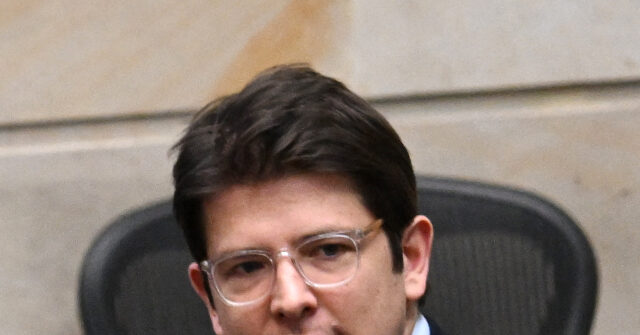Colombian conservative Senator Miguel Uribe, who has been unconscious and in critical condition since an assassination attempt in early June, is the frontrunner in the 2026 presidential election, a poll published on Monday found.
Colombia is slated to hold a new presidential election between May and June 2026 to choose who will succeed current far-left President Gustavo Petro, whose term should end in early August 2026. The Colombian constitution strictly states that a president may only serve for a single four-year term and is barred from ever seeking reelection.
While the 2026 presidential campaign has not officially started in the South American nation, 75 Colombians have so far reportedly expressed their intention to run for president next year. Sen. Uribe, of the conservative Democratic Center party, soft-launched his presidential campaign in October 2024.
In early June, during a campaign event in the capital city of Bogotá, a child reportedly between the ages of 14 and 15 shot Uribe three times, inflicting two gunshot wounds to his skull and one to his left leg. Since then, the senator has remained unconscious and is fighting for his life at the Intensive Care Unit (ICU) of the Santa Fe Foundation of Bogotá. Sen. Uribe’s mother, Diana Turbay, was a journalist and daughter of former president Julio César Turbay. She was killed in 1991 in a failed rescue attempt after late Colombian drug lord Pablo Escobar ordered her kidnapping.
The latest public update from the medical center, dated July 4, indicates that Uribe presents stability in his hemodynamic conditions, requires permanent mechanical ventilatory support, and is under sedation and neuromuscular relaxation. The Foundation explained that while Uribe’s scheduled procedures show results favoring his stability and evolution, his condition remains critical and his neurological prognosis is reserved.
The polling firms Guarumo and Ecoanalítica conducted a joint survey between July 1-5 gauging voter interest among Colombians the presidential race. The survey found that Sen.Uribe leads the list of presidential hopefuls; 13.7 percent of respondents expressed their intention to vote for him.
Conservative Journalist Vicky Davila, a fierce critic of President Petro, came in second place in the poll at 11.5 percent. Gustavo Bolívar, a leftist former senator who served as General Director of Social Prosperity until Petro fired him in May, came in third place at 10.5 percent.
The polling firms also asked respondents to choose in a hypothetical internal primary grouped by political ideology. The survey found that in a hypothetical conservative primary, Sen. Uribe would overwhelmingly win by 74.4 percent. Dávila would obtain 51.9 percent among center-right voters and Bólivar led among leftists with 29.2 percent.
The firms also measured the current perception of Petro’s government. Slightly over half, 50.3 percent, responded that they rated Petro’s performance as “poor or terrible,” 30.3 percent of respondents answered that Petro’s government has been “good,” and only 8.4 percent rated it as “excellent.”
The strict presidential single-term limits have existed in Colombia since 1910 with the exception of a nine-year period beginning in 2005, when the Colombian constitution was amended to permit a president to run for a second four-year term. The amendment allowed former conservative President Álvaro Uribe Vélez (no relation to Sen. Miguel Uribe) and his successor, center-right former President Juan Manuel Santos, to be successfully reelected. In 2015, during Santos’ second term, the constitution was once again amended to restore the single four-year term limit.
Petro, who cannot run for president again, has repeatedly expressed his intention to call for a Constituent Assembly to reform the Colombian constitution despite having claimed at least nine times throughout his 2018 and 2022 campaigns that he would never do such a thing. Petro included that promise as one of his campaign commitments in 2018.
Petro announced in late June that he seeks to introduce a referendum in next year’s ballot to either approve or reject a constitutional assembly. At press time, local authorities have neither approved nor rejected the referendum proposal.
According to the results of Guarumo and Ecoanalítica’s poll, 53.9 percent of respondents expressed their rejection of a constituent assembly proposal, versus 31.3 percent who said they were in favor and 14.9 percent who chose not to answer.
Christian K. Caruzo is a Venezuelan writer and documents life under socialism. You can follow him on Twitter here
Read the full article here


